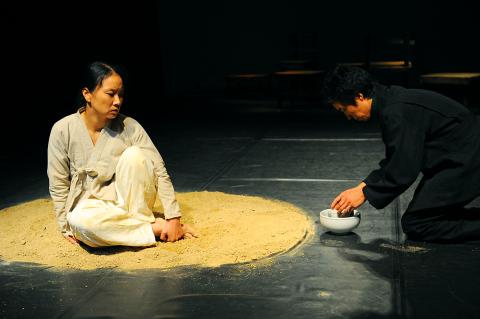On Nov. 13, 1970, Jeon Tae-il bid his mother goodbye and went to a labor demonstration in downtown Seoul alone. Several hours later, the 22-year-old worker set himself on fire, shouting: “Observe the Labor Standards Act! We are not machines!”
Jeon did not survive his burns and his death spurned workers, university students and activists into action.
Forty years later, memories of Jeon live on in Mom, Bye (再見!母親), a collaboration between veteran Taiwanese theater director Wang Mo-lin (王墨林) and Shiim, a Seoul-based theater group founded by artist duo Hong Seung-yi and Baek Dae-hyun.

Photo Courtesy of Waterfield Studio
The Taiwan-Korea collaboration is part of Wang’s continuing efforts to introduce local audiences to artists and groups from other Asian countries, many of which are similar to Taiwan historically, culturally, and sociopolitically, the director says.
Inspired by a memoir based on conversations and interviews with Jeon’s mother Lee So-seon, the play revolves around the moments Jeon shared with her on the day he set himself on fire.
Wang says the work is not intended to call for “a protest or revolution” but to show “a worker’s frustrations, conflicts and fear.”
The play takes audiences back to the morning before Jeon left home to end his life. After staying up all night cleaning his room, the young man cooked breakfast for his mother and asked if she wanted to go to the demonstration with him.
“At first, I thought, ‘How could he be so cruel as to let his mother watch him burn to death?’ It hurts me to realize that he was afraid. He needed courage. He needed his mom,” Wang said.
Baek, who co-wrote the script with Wang, said that he wanted to present Jeon in a way that hasn’t been seen before.
“I show Jeon as a ghost who lives in the mother’s imagination and memory. I try to grasp what he might think and feel on that day over and over again ... My biggest wish is to bring some comfort to Lee through the work,” Baek said at a press conference on Tuesday.
Lee, now in her 80s, has dedicated her life to the workers’ movement since Jeon passed away.
Having premiered in Busan last September, Mom, Bye is currently playing at the Guling Street Avant-Garde Theatre (牯嶺街小劇場). The Taipei version includes four female workers and activists from the National Federation of Independent Trade Unions (全國自主勞工聯盟), who read entries from Jeon’s published diary onstage.
“Whether or not the inclusion of the female workers makes sense in terms of the content of the work is of no importance to me,” Wang said. “What matters is that the workers participate, speak out, and through the act of speaking, they connect with Jeon Tae-il.”
The performance will be in Korean and Mandarin with Chinese subtitles.

President William Lai (賴清德) yesterday delivered an address marking the first anniversary of his presidency. In the speech, Lai affirmed Taiwan’s global role in technology, trade and security. He announced economic and national security initiatives, and emphasized democratic values and cross-party cooperation. The following is the full text of his speech: Yesterday, outside of Beida Elementary School in New Taipei City’s Sanxia District (三峽), there was a major traffic accident that, sadly, claimed several lives and resulted in multiple injuries. The Executive Yuan immediately formed a task force, and last night I personally visited the victims in hospital. Central government agencies and the

Australia’s ABC last week published a piece on the recall campaign. The article emphasized the divisions in Taiwanese society and blamed the recall for worsening them. It quotes a supporter of the Taiwan People’s Party (TPP) as saying “I’m 43 years old, born and raised here, and I’ve never seen the country this divided in my entire life.” Apparently, as an adult, she slept through the post-election violence in 2000 and 2004 by the Chinese Nationalist Party (KMT), the veiled coup threats by the military when Chen Shui-bian (陳水扁) became president, the 2006 Red Shirt protests against him ginned up by

As with most of northern Thailand’s Chinese Nationalist Party (KMT) settlements, the village of Arunothai was only given a Thai name once the Thai government began in the 1970s to assert control over the border region and initiate a decades-long process of political integration. The village’s original name, bestowed by its Yunnanese founders when they first settled the valley in the late 1960s, was a Chinese name, Dagudi (大谷地), which literally translates as “a place for threshing rice.” At that time, these village founders did not know how permanent their settlement would be. Most of Arunothai’s first generation were soldiers

Among Thailand’s Chinese Nationalist Party (KMT) villages, a certain rivalry exists between Arunothai, the largest of these villages, and Mae Salong, which is currently the most prosperous. Historically, the rivalry stems from a split in KMT military factions in the early 1960s, which divided command and opium territories after Chiang Kai-shek (蔣介石) cut off open support in 1961 due to international pressure (see part two, “The KMT opium lords of the Golden Triangle,” on May 20). But today this rivalry manifests as a different kind of split, with Arunothai leading a pro-China faction and Mae Salong staunchly aligned to Taiwan.